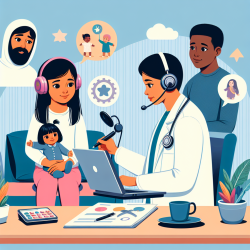Empowering Speech-Language Pathologists: Insights from Implementation Science to Enhance Child Outcomes
As a passionate speech-language pathologist, you understand the importance of making data-driven decisions to achieve the best outcomes for children. The Proceedings of the 6th UK and Ireland Implementation Science Research Conference provides valuable insights that can significantly improve your practice. This blog will explore key findings from the conference and offer actionable steps to implement these insights effectively in your work.
Understanding Interprofessional Collaboration
One of the standout presentations at the conference was the realist synthesis of evidence on interprofessional collaboration to improve care outcomes for older people. Although the primary focus was on older adults, the principles of effective interprofessional collaboration are highly applicable to pediatric settings. The research highlights the dynamic interactions between context, mechanisms, and outcomes that can drive successful collaboration.
Key Findings:
- Context: Professional experience in different areas of service delivery is crucial. For example, team members with diverse backgrounds bring pre-existing relationships with other healthcare professionals, facilitating cross-sectoral communication and trust.
- Mechanisms: Good communication and trust among team members lead to enhanced continuity of care.
- Outcomes: Improved collaboration results in better care outcomes, which can be adapted to enhance speech-language pathology services for children.
Implementing the Insights
To apply these findings in your practice, consider the following steps:
- Assess Team Composition: Evaluate the professional backgrounds of your team members. Ensure that your team includes professionals with diverse expertise in pediatric care.
- Foster Communication: Develop regular communication channels, such as weekly meetings or shared digital platforms, to facilitate ongoing dialogue among team members.
- Build Trust: Engage in team-building activities and create a culture of mutual respect and trust. Recognize and value each team member's contributions.
- Monitor Outcomes: Implement a system to track the outcomes of your collaborative efforts. Use data to identify areas for improvement and celebrate successes.
Encouraging Further Research
While the conference provided a robust foundation, further research is essential to tailor these insights specifically to pediatric speech-language pathology. Engage in or support research initiatives that focus on interprofessional collaboration in child therapy settings. Collaborate with academic institutions or professional organizations to contribute to the growing body of evidence.
Conclusion
By integrating the principles of effective interprofessional collaboration into your practice, you can enhance the quality of care you provide to children. The insights from the Proceedings of the 6th UK and Ireland Implementation Science Research Conference offer a valuable roadmap for achieving these goals. Embrace these strategies, foster a collaborative environment, and commit to continuous improvement to create the best outcomes for the children you serve.
To read the original research paper, please follow this link: Proceedings of the 6th UK and Ireland Implementation Science Research Conference.










